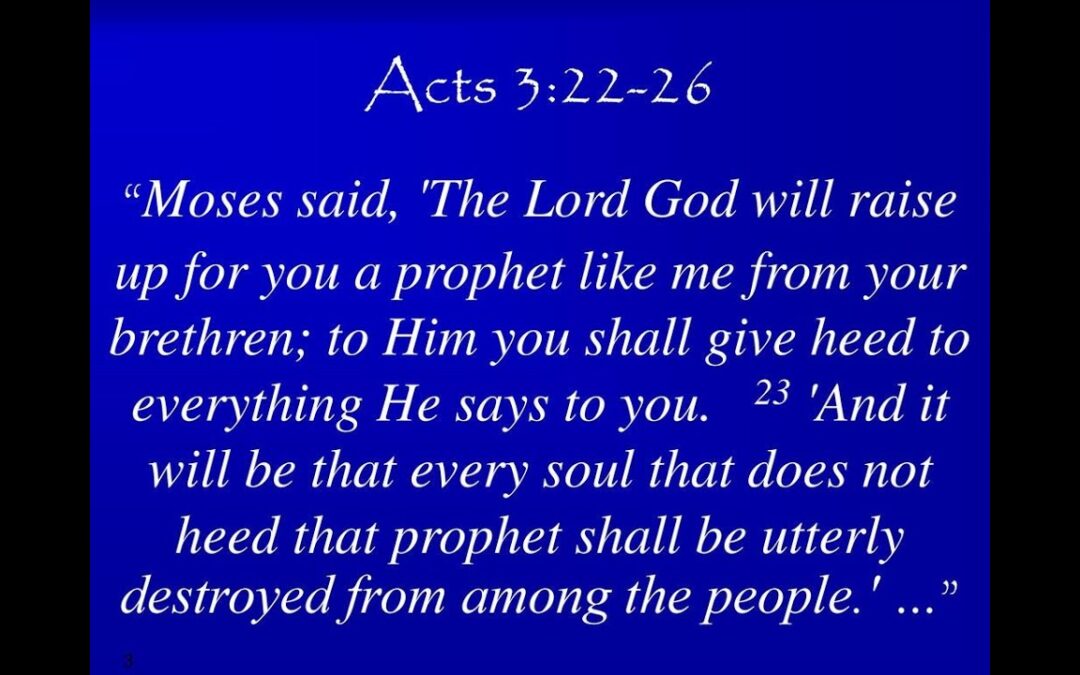As Peter continues highlighting the preeminence of Christ in his sermon in Acts 3, he cites Moses’ prophecy about a future prophet found in Deut. 18. The only acceptable response to this prophet (Jesus Christ) appears at the end of v.22 and that is to listen to/take heed to/obey everything he says. God not only spoke this command through Moses, but also later on audibly from a cloud in Luke 9 on the mount of transfiguration—This is My Son; my chosen one. Listen to Him! Although there was no consequence for failing to listen to him, given in that divine utterance from the cloud, there is in Deut. 18, which Peter quotes in Acts 3:23. You may notice that Peter uses slightly different wording, which is why it’s not set in all CAPS in the NASB.
Here we find out that it’s not just a suggestion nor can conformity to Christ’s words be treated as optional. To refuse to bring our hearts under what Christ has said is a serious offence against God and persistence in it leads to eternal consequences. What happens to those who don’t obey Christ’s words is that they are completely destroyed. In other words, they have no share in the blessings of God, but only the curses. Christ had already taught this in the gospel of John 3:36 He who believes in the Son has eternal life; but he who does not obey the Son will not see life, but the wrath of God abides on him; John 12:47 If anyone hears My sayings and does not keep them, I do not judge him; for I did not come to judge the world, but to save the world. 48 He who rejects Me and does not receive My sayings, has one who judges him; the word I spoke is what will judge him at the last day.
Again, the dividing line between one who is part of Christ’s kingdom is based on if one listens and turns to Christ, regardless of what comes out of one’s mouth. This is why carrying out the Great Commission must involve far more than just invoking a profession of faith from someone. At the end of the Matt. 28, Christ instructs his disciples to teach others all that he commanded. And how many will end up suffering in eternal judgment and remember a family member or friend who tried to share truth with them, and yet they continually rejected it, while living their life blaspheming God by insulting him or ignoring him in their disobedience?
Nobody can ultimately escape the accountability of Christ’s words.
That begs the question: What do you do with what you hear? Is the accountability to Christ’s words something you consider often? It should be, especially because of what Christ says in Luke 12:48b… From everyone who has been given much, much will be required; and to whom they entrusted much, of him they will ask all the more. Or how about what James writes in James 1:22 But prove yourselves doers of the word, and not merely hearers who delude themselves. 23 For if anyone is a hearer of the word and not a doer, he is like a man who looks at his natural face in a mirror; 24 for once he has looked at himself and gone away, he has immediately forgotten what kind of person he was. 25 But one who looks intently at the perfect law, the law of liberty, and abides by it, not having become a forgetful hearer but an effectual doer, this man will be blessed in what he does.
Let us take heed to the Prophet who has come and died for our sins to give us ears to hear the truth and a heart to obey it.

